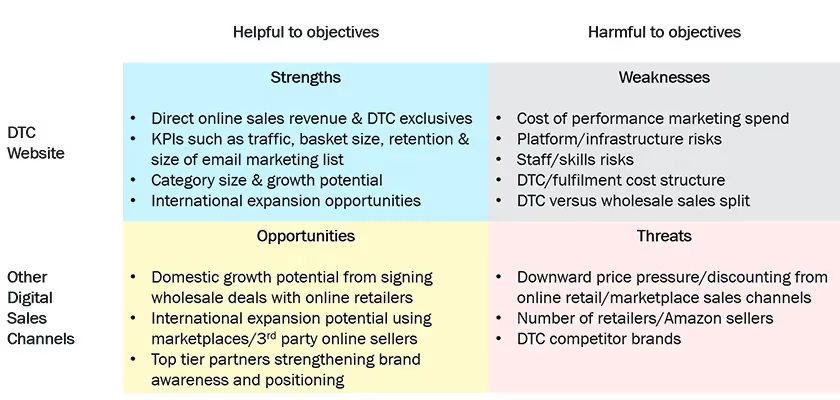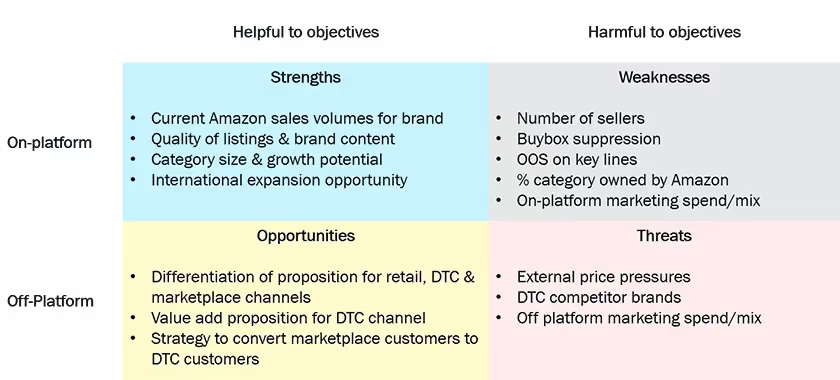What Private Equity Needs to Know About Amazon
Read what private equity needs to know about Amazon to inform due diligence activity and growth strategies for investments in your consumer portfolio.
In March we ran a webinar for investors in consumer brands, to explain what private equity needs to know about Amazon. We thought it was also worth publishing a blog on the topic, to highlight why Amazon should be considered by investors at both the pre-deal and post-deal stage of the investment cycle. Below we outline how Amazon should be considered as part of digital due diligence, and why it's essential for your existing consumer portfolio companies to have an Amazon strategy; whether it's to compete or to utilize it as a channel to market.
How Amazon works
Firstly, it's worth explaining the different ways that Amazon works with brands: the three models as called Vendor or 1P, Seller or 3P or a hybrid of these two models. In the Vendor or 1P model, the brand sells its products directly to Amazon - as it would do to any retailer - and Amazon is then free to sell those products on the platform at whatever price it likes (within Europe and many other countries outside the USA at least).
Amazon chooses which products it wants to stock; but the brand is still responsible for supplying the product content for listings pages and paying for any Amazon advertising to promote the listings. In the Seller or 3P model, a business pays Amazon a percentage of sales fee to list the products they choose to sell on the marketplace; retaining ownership of the stock, setting prices and managing product content and advertising.
The seller can also be the brand, or a third-party seller such as our parent company Pattern. The seller may wish to fulfil the products themselves, or use Amazon's fulfilment service for an additional fee. The hybrid model sees some products sold 1P directly by Amazon, and some sold 3P by the brand or third parties that the brand has authorised to represent it on the marketplace.
Amazon due diligence
There are two aspects of digital due diligence for a consumer brand where a consideration of Amazon is important. The first is within the general strengths, weaknesses, opportunities and threats analysis for the brand's ecommerce presence. Shown below you can see that we would consider the brand's Amazon presence within the opportunities and threats sections.

Meanwhile, for brands where Amazon has been identified as being important to their ecommerce performance, we would also carry out an Amazon-specific SWOT analysis. This provides more detail on what private equity needs to know about Amazon in relation to a specific brand. An example of the kind of data and proof-points we are interested in is shown below.

We have developed a number of frameworks for scoring the presence and potential for a brand to sell its products on Amazon, that help with analysing all of the above.
Why every brand needs an Amazon strategy
Amazon dominates online sales in the USA, and is taking an increasing proportion of online spend in other markets. This trend has only been accelerated by the COVID-19 pandemic, which saw the marketplace report sales that were up by 26% in value, and 32% in volume terms, in its latest quarter to March 31. Analysis of why shoppers choose different online channels for the same purchases, clearly indicates why there is a place for Amazon.
Retailer's website : Chosen because of easy returns and exchanges, customer service and support and their loyalty programs.
Brand's website: Promises authenticity of product, delivers unique products or services and allows product customization.
Online marketplaces: Price, fulfillment options and product selection are the key drivers for purchasing through this channel.
With this in mind, a brand's Amazon strategy could be to compete or co-operate with the marketplace. If it wants to compete, it must focus on all of the things that customers tend to turn to a brand's own site for, and be competitive on the factors that cause shoppers to turn to marketplaces. Even then, there can be a case for having a presence on the marketplace as a defensive strategy to reduce the likelihood of unauthorized third party sellers listing the brand's products for sale in ways that is damaging to the brand.
If a brand wants to co-operate with Amazon as a channel to market, the strategy should include deciding which model is appropriate where and consider the key roles the marketplace can play to drive customer acquisition and revenue, brand awareness and act as a shortcut to internationalisation. The digital due diligence SWOT analysis frameworks shown above can also be useful for determining the role your portfolio companies want Amazon to play in their online sales strategies; and whether those strategies are proving successful.
If you are an investor in consumer brands and would like to see the full deck outlining what private equity needs to know about Amazon, you can contact us and we would be delighted to send it to you. Similarly, if you need support with digital due diligence, or a digital challenge that an existing portfolio company is facing, please contact us on the above email address and we would be delighted to assist.


.jpg)







